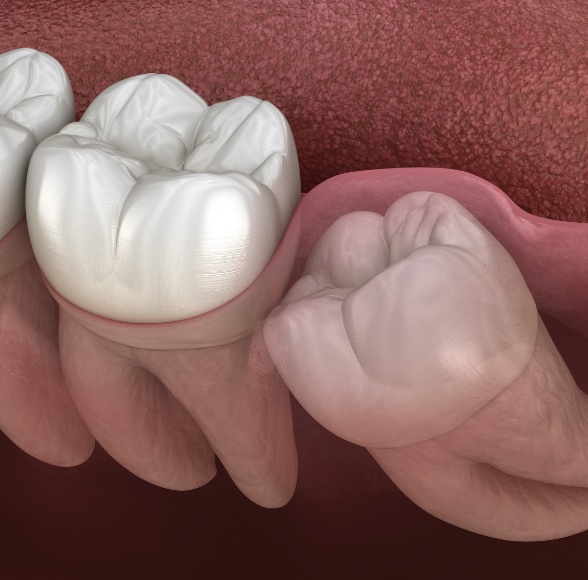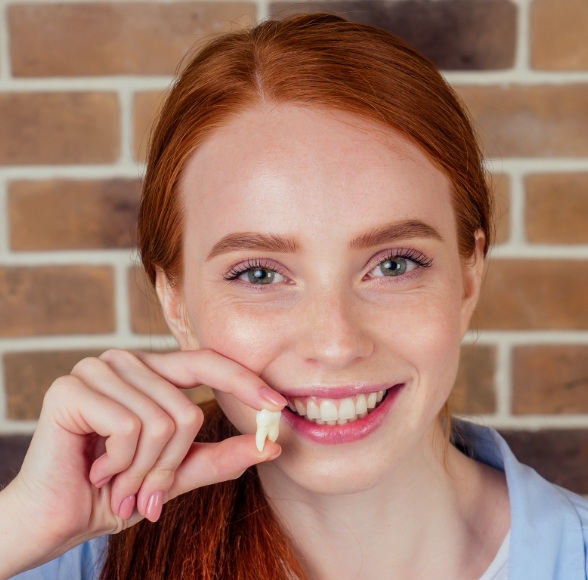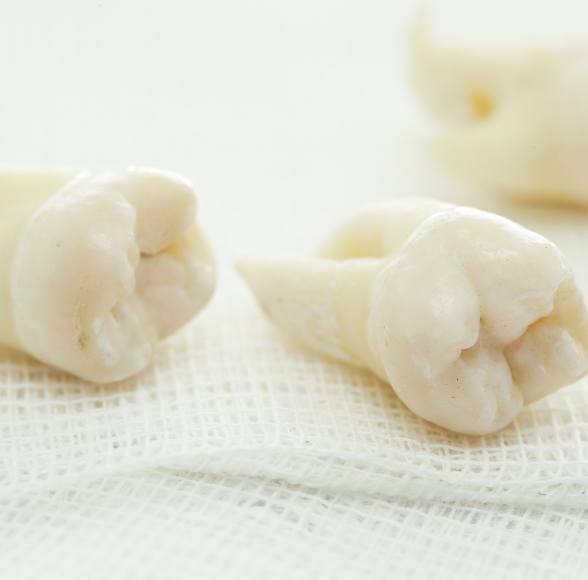Wisdom Tooth Extractions – Williamstown, NJ
Stop Problematic Teeth
from Ruining Your Smile
Very few people get by without having their wisdom teeth extracted. Most of the time, these teeth are simply too large to fit comfortably in anyone’s mouth. There was a time when these teeth served a very important purpose—but you have to go back quite a few years to when our prehistoric ancestors needed to chew raw plants and tough meats. Since then, our eating habits have dramatically changed, and wisdom teeth have become obsolete. As a consequence, extracting wisdom teeth is practically routine. However, just because something is routine doesn’t mean that it’s not serious. Dr. Kassem has the training and experience to perform wisdom tooth extractions in Williamstown, NJ, so you can feel completely confident trusting your smile’s health in his hands.
Why Choose iSmile Dental Arts
for Wisdom Tooth Extractions?
- Gentle, Caring Dentist By Your Side
- Experienced Team Using Modern Technology
- Affordable Payment Options Available
Why Do Wisdom Teeth Need to Be Removed?

In addition to simply being too large, wisdom teeth are typically positioned at an incorrect angle. As a result, they can put pressure on adjacent teeth affecting the alignment of those teeth and causing discomfort. For this reason, orthodontists often recommend that patients have their wisdom teeth removed at the conclusion of treatment.
Wisdom teeth are also more difficult to keep clean because they are located so far back in the mouth. For this reason, the risk of tooth decay and periodontal disease increases, making extraction all the more advisable.
Removing Your Wisdom Teeth

The entire process of extracting wisdom teeth usually takes Dr. Kassem about one hour, depending on whether the teeth are impacted in the gum or have erupted. Depending on the size and position of the tooth, Dr. Kassem may need to section the tooth and remove it in smaller pieces.
Care After Oral Surgery

You can expect some discomfort after your wisdom teeth have been removed. Swelling is likely, too, and usually peaks three or four days after surgery. To reduce facial swelling, you can use an ice pack for 10-minute intervals. And be sure to stick to the schedule Dr. Kassem recommends for pain medication.
Rest and relaxation for the first few days after your treatment are best. Do not lift anything heavy and don’t participate in rigorous exercise. Nutrition is important to the healing process. A diet of soft foods is recommended. Staying well hydrated is important, too. However, you should not use a straw; the sucking action can cause blood clots in the surgery sites to dislodge.
Finally, follow Dr. Kassem’s instructions for proper oral hygiene during healing from wisdom teeth extraction. A couple of days after surgery you can gently brush your teeth, avoiding the surgery sites. Irrigate the sockets in order to remove trapped particles of food.
Contact our Williamstown, NJ location today if you have any questions about wisdom teeth extraction, or if you’re ready to schedule a visit with Dr. Kassem.
Understanding the Cost of Wisdom Tooth Extractions

Wisdom teeth extractions are a routine procedure, but it’s still one that can make patients a little bit nervous. The last thing we want to do is to add to that by making finances a stress factor. For that reason, we endeavor to make paying for your dental care just as easy as every other part of it.
We’ll give you a complete summary of what you’ll pay for care when we meet you in person, but before then, here’s what you should know about what a wisdom tooth extraction is likely to cost you.
Factors That Can Impact the Cost of Wisdom Tooth Extractions

The reason we can’t just say what your wisdom tooth extraction is going to cost without meeting you first is that there are several variables that can affect the cost of your dental care in one way or another. The first is the number of teeth that you need to have removed; some people are born with less than four of them, which means that they may have to pay less for all of their extractions.
Some teeth are also more difficult to remove than others. Some are impacted, for example, which can make them a little complicated to take out. Some impactions are also worse than others—soft tissue impactions are partially emerged, while bony impactions are lodged completely in the jaw. The latter, as you can imagine, are more difficult to remove.
Most wisdom tooth removals also include some kind of sedative or anesthetic. The variety you use will influence what the treatment will cost you. We’ll talk you through this and every other option available to you when we meet you in person.
Does Dental Insurance Cover Wisdom Tooth Extractions?

Oral surgery isn’t always covered by insurance, but wisdom teeth surgery is often a notable exception. That being the case, you can usually expect to have at least a portion of your wisdom tooth surgery covered by your plan.
However, it’s still a good idea to consult with your insurance company, making sure that you’ve met your deductible and have yet to exceed your yearly maximum. We’ll be happy to assist you in this process.
Other Options for Making Wisdom Tooth Extractions Affordable

Of course, not everyone has insurance. We still want your wisdom tooth extraction to be affordable, which means that we have options available to help your dental care fit your budget.
For one, we have an in-house membership plan that can make the services you receive much more affordable. For a flat annual fee, you can get a 30% discount on care that you receive from us, as well as free checkups and exams.
We also frequently work with CareCredit, which can offer financing to patients who are interested in splitting the cost of care across several months. If you want to know more, make an appointment with us and we’ll be happy to tell you more at a consultation.
Wisdom Tooth Extractions FAQs
Does Wisdom Tooth Removal Hurt?
You should be happy to hear that the very first thing we’ll do during your wisdom tooth surgery is numb your mouth with a local anesthetic, so pain isn’t something you need to worry about at all! You may feel some slight pressure during the procedure, but it won’t be outright painful. Some mild soreness or general discomfort is common following the procedure, but as long as you follow your aftercare guidelines, you’ll feel back to normal within about a week or so.
Why Do We Have Wisdom Teeth?
Believe it or not, wisdom teeth once served a very important purpose for our ancestors. Since early humans ate a very coarse diet that consisted of several raw foods like meats, berries, roots, nuts, and other earthy items, nor did they cook or prepare food how we do today, they needed an extra set of molars to help out their jaws. But since food today is softer and easier to eat, wisdom teeth aren’t really necessary anymore and our jawbones have evolved to not have enough room for them once they erupt.
Will My Dental Insurance Help Pay for Wisdom Tooth Extractions?
Fortunately, most dental plans do include coverage for wisdom tooth extractions if the procedure is deemed as medically necessary—which is often the case! This amount can vary from plan to plan, but you can often expect to receive around 50% or so of your procedure covered. We’re happy to sit down with you and review the details of your insurance plan so that you can feel certain you’re maximizing your benefits and lowering your total cost. If needed, we can discuss financing as well to make it even more affordable.
What Can I Do to Prepare for Wisdom Tooth Extractions?
Your wisdom tooth surgery isn’t something you should take lightly; fortunately, there are several things you can do in preparation for it! Consider the following tips:
- Arrange to have somebody drive you to and from the appointment, as you won’t be fit to drive after receiving anesthesia. It’s also advised that you have them keep an eye on you for a few hours following the procedure.
- Our team will need to know what prescribed and over-the-counter medications you take, if any, to avoid unwanted interactions.
- If you’re receiving general anesthesia, avoid eating or drinking after midnight the night before your procedure. Also refrain from smoking for at least 12 hours before the procedure.
- Consider wearing comfortable clothing to your appointment. If you’re receiving IV sedation, wear loose clothing or a shirt with sleeves that are easy to roll up.
- Stock up on plenty of soft foods and liquids; you’re going to need them for the next few days while your mouth heals up!




